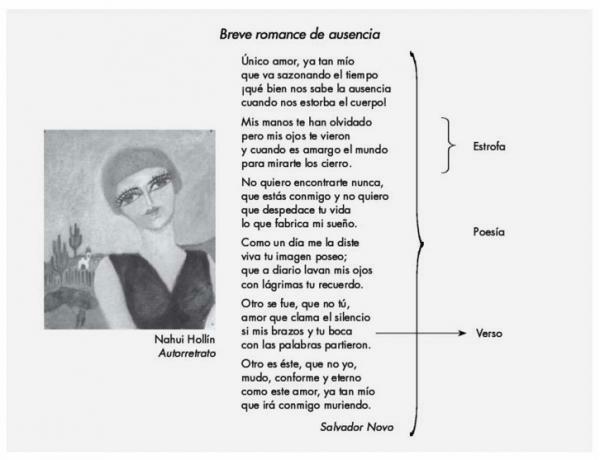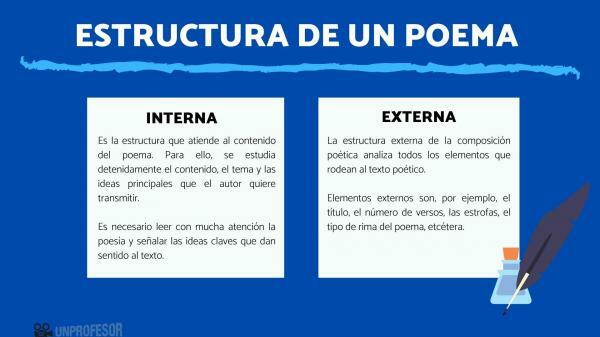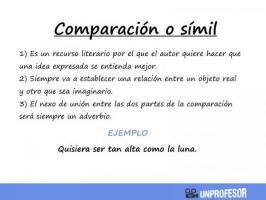POETIC text: characteristics and examples

The poetic text It is the most difficult to define of all literary texts since it is characterized above all by its mutability, that is, by its ability to adapt to the personal style and creativity of its author. In this lesson from a TEACHER, we will try to group the features of this type of text, taking into account that there are exceptions for each of them. We will also contribute several examples to show us their singularities.
So prepare a dictionary of rhymes, consult your most intimate feelings, and let your imagination fly, because we are about to know the characteristics and examples of the poetic text.
The poetic text, also called lyrical text Or simply poetry, it's a literary text which is defined by the RAE dictionary as
"Manifestation of beauty or aesthetic feeling through words, in verse or prose."
This means that a poetic text is a text that is not limited simply to inform about reality, but has a aesthetic function. The importance of this type of text lies not so much in the content of the message it conveys, but in the
shape where it does. This form is always subjective and determined by the style of the author of the text.Next, we are going to discover more about the characteristics that define most poetic texts.

Although in general we find a series of elements that most poetic texts share and that make up their characteristics, we must always bear in mind that the poet is the one who decides the type of language and form that he uses for his text or poem. This makes each of these texts unique, and therefore, there are multiple exceptions to each of the following characteristics of the poetic text. Its unique, subjective and changing nature is the first of these:
- Expression of the personal and subjective intention of the poet. This can be the expression of his most intimate feelings and thoughts, of his vision of the world, the subjective and aesthetic description of concrete or abstract themes, etc.
- Universal themes. The themes of poetry are inexhaustible, but this is what makes them so unique! Some of the most recurrent are: love, nature, the passage of time, death, or suffering. These feelings or descriptions are normally known by everyone, which means that many times we can empathize with the personal way in which the author treats them. Some authors also use literary topics as themes: the carpe diem, tempus fugit, locus amoenus, etc.
- Use of literary resources: these resources help to achieve the aesthetic function of the poetic text. We can find metaphors, parallels, personifications, similes, etc.
- Games with sound and meaning of words.
- Rhythm and musicality that arise from its external formal structure, that is, from the way in which the poet structures the poem to convey his message (type of verses, stanzas, rhymes, etc.)
- Brevity and thematic unit. This is another of the characteristics of a poetic text and it is that they are generally shorter than other types of texts. literary, and have one or more themes that are explored from the beginning to the end of the text in a coherent and compact.
- More or less free interpretation: generally, poems can be interpreted in different ways depending on the reader, and many leave ambiguity enough for the reader to make them his own, identifying the feelings expressed with his own feelings, for example. The reader's reaction and active participation in the text is often expected and encouraged.
Taking into account all these characteristics, we can say that the essential thing in a poetic text or poem is the excuse me says things (more than what it says in itself), and its language chosen not necessarily for the objective meaning of the dictionary that it conveys, but with the intention of the author of express something subjective and aesthetic.
Of all the literary texts, the poetic text is the one that most implies the author's presence, either directly by expressing your intimate feelings and thoughts, or indirectly through through the language you have chosen, and the images or reactions you intend to generate through this.

If you know a little about the world of poetry, and have read or written a poem before, surely you will be thinking that it is still necessary to mention an important characteristic (the most visible!) of the poetic text: its external structure, that is, the way in which words are placed and organized in the text.
And it is true that many poetic texts have a shared characteristic that we have not yet listed: many are written in verse, and organized by stanzas, who can have different names according to their characteristics (do you already know the famous Alexandrian?).
But if we remember the definition of the RAE that we have given at the beginning of the lesson, we will see that our beloved dictionary tells us that poetic texts can be "In verse or in prose". As always in linguistic matters, the RAE is right, and although it is true that many poetic structures such as the sonnet, romances and songs, for For example, they are composed of verses and stanzas, there are many poetic texts that have a free structure (without defined verses or stanzas), or they are written in prose.
It should also be remembered that not all literary texts written in verse are poetic texts! In fact, there are many dramatic and narrative texts that tell their stories through verses and stanzas, so study well the characteristics of each of these literary texts, and don't be fooled by the structure!
The external structure of poetry in verse
Anyway, since writing in verse is very frequent in the poetic text, it is important to talk a little about some elements of poetry in verse that every literature teacher makes his students analyze before or after talking about the meaning of the poem in question. These are as follows:
- Verse: set of words that form what would be the "phrases" of a poem.
- Stanza: set of verses. A poem can have a single stanza, or be made up of several stanzas, which group the same or a different number of verses.
- The metric: Art that analyzes the structure of poetic texts (of the verse, the stanza, and the poem itself), determining its class and the different combinations of verses and stanzas that can occur.
- The measure of verses In Spanish: some poetic texts with a fixed external structure (such as the sonnet, for example) require that each of their verses have a certain number of syllables. Are they are counted in Spanish as follows: when the last word of the verse is sharp, one more syllable is counted; when the last word is flat, the number of syllables remains unchanged; and when the last word is esdrújula, a syllable less is counted to the verse. When we measure verses, it is also important to take into account phenomena such as sinalefa, which makes us join the end of a word with the beginning of another in a single syllable if both are vowels. Depending on the number of syllables, the verses can be major art (9 or more), or minor art (8 or less).
What's more, the rhyme It is another of the characteristics of a poetic text because, although not everyone has to rhyme, when they do, the rhyme can be defined in many different ways. Some are:
- Consonant and assonance: consonant when all the sounds of the last syllable of the verse coincide, and assonance when only the vowel sounds coincide.
- Chained rhyme (abab, for example), continuous (aaaa / bbbb…), hugged (abba, bccb…), twin (aabb…)

Now that we've seen the whole theory, it might be a bit difficult for you to imagine what this all looks like in practice. Below we have prepared some examples of poetic texts so that you have no doubt:
Example 1: Sonnet XXIII by Garcilaso de la Vega. Poem in verse, of fixed structure with Alexandrian verses and chained rhymes. The theme is carpe diem (or its variety, collige virgo roses)
While rose and lily
the color is shown in your gesture,
and that your ardent, honest look,
it kindles the heart and restrains it;and as long as the hair, that in the vein
from the gold was chosen, with swift flight,
for the beautiful white collar, upright,
the wind moves, scatters and messes up;take hold of your joyful spring
the sweet fruit, before the angry time
cover the beautiful summit with snow.The icy wind will wither the rose,
light age will change everything,
for not moving in his habit.
Example 2: Romance de la luna luna, by Federico García Lorca. Popular romance with quartets of eight-syllable verses that tells a story whose main theme is death.
The moon came to the forge
with his bustle of spikenard.
The child looks at her.
The boy is looking at her.
In the air moved
move the moon its arms
and teaches, lewd and pure,
her breasts of hard tin.
Run away moon, moon, moon.
If the gypsies came,
they would do with your heart
white necklaces and rings.
Child let me dance.
When the gypsies come,
they will find you on the anvil
with the eyes closed.
Run away moon, moon, moon,
I already feel his horses.
Child leave me, do not tread,
my starchy whiteness.
The rider was approaching
playing the drum of the plain.
Inside the forge the boy,
she has her eyes closed.
Through the olive grove they came,
bronze and dream, the gypsies.
Heads raised
and narrowed eyes.
How the zumaya sings,
oh how he sings in the tree!
The moon goes through the sky
with the child by the hand.
Inside the forge they cry,
screaming, the gypsies.
The air watches her, she watches.
the air is veiling her.
Example 3: A hemisphere in a hair, by the famous French poet Charles Baudelaire. It is a prose poem that praises the hair of his beloved and generates various aesthetic images through it.
Let me breathe a long, long time, the smell of your hair; immerse my face in them, like a thirsty man in spring water, and wave them with my hand, like a scent handkerchief, to shake memories into the air.
If you could only know everything I see! Everything I feel! Everything I hear in your hair! My soul travels in perfume like the soul of other men in music.
Your hair contains a dream, full of canopies and poles; they contain vast seas, whose monsoons lead me to climates of enchantment, in which space is bluer and deeper, in which the atmosphere is perfumed by fruits, leaves and skin human.
In the ocean of your hair I glimpse a port teeming with melancholic songs, vigorous men from every nation and ships of all forms, which cut out their fine and complicated architectures in an immense sky in which the eternal hot.
In the caresses of your hair I find again the languor of the long hours spent on a couch, in the camera of a beautiful ship, rocked by the imperceptible rocking of the port, between pots and refreshing jugs.
In the burning home of your hair I breathe the smell of tobacco mixed with opium and sugar; in the night of your hair I see the infinite tropical blue shine; on the fuzzy edges of your hair I get drunk with the combined scents of cotton, musk and coconut oil.
Let me bite your braids, heavy and black, for a long time. When I nibble on your unruly elastic hair, it seems to me like memories.
Example 4: Rima XXI, by Gustavo Adolfo Bécquer. It is a short poem consisting of a stanza with four verses that relate love to poetic creation.
What is poetry? You say while you nail
in my pupil your blue pupil.
What is poetry! And you ask me?
Poetry... Are you.
Example 5: I'm going to sleep, by Alfonsina Storni. It is a sonnet with Alexandrian verses, but with a totally free rhyme. The theme of it is very intimate and personal for the author, symbolizing a near death.
Flower teeth, dew cap,
Herb hands, you fine nurse,
lend me the earthy sheets
and the weed moss quilt.I'm going to sleep, my nurse, put me to bed.
Put me a lamp at the bedside;
a constellation, whichever you like;
they are all good: lower it a little.Leave me alone: you hear the buds break ...
a celestial foot cradles you from above
and a bird draws you a few barsso you forget… Thank you. Ah, a commission:
if he calls again on the phone
You tell him not to insist, that I have left ...


![All SUBGENERS of the DRAMA genre: older and younger [SUMMARY !!]](/f/8066bbe44ef24320ce85203d444172b6.jpg?width=300&height=200)
